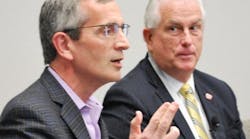ConocoPhillips’ Greg Leveille (left) and Charles McConnell, now of the University of the University of Houston, were joined by ABB’s Håvard Devold and Troy Hobson for a panel discussion on trends driving the future of the oil & gas industry.
The panel discussion “What’s Driving the Energy Future for Oil and Gas” touched on—of all things—coal.
Specifically, the failure of the coal industry a few decades back to innovate and stay competitive. “The coal industry lobbied for a political solution to avoid innovation,” explained panelist Charles McConnell, executive director of carbon management and energy sustainability with the University of Houston. “That experience was not lost on energy companies of today.”
The energy companies of today were represented on this ABB Customer World panel by Greg Leveille, chief technology officer with ConocoPhillips. Rounding out the panel were Håvard Devold, group vice president, digital lead with ABB; and moderator Troy Hobson, ABB group account manager, both of whom have partnered on projects with oil and gas customers.
Hobson summed up the focus of this session right at the start. “This is about how we can help oil and gas develop winning strategies,” he said.
They’re already on a winning streak, according to Leveille, who labeled the current state of oil & gas as an unprecedented boon. “Big transformation is underway—it has been amazing. The way we manage oil and gas is changing.”
That change is being driven by digital. (Sound familiar?) With shifting customer demands and a growing global population that increasingly requires energy, the need to develop smart, safe, sensible solutions is paramount. But balance—long understood in the energy world—remains a sticking point. Hobson shared a slide that illustrated the three elements of energy production: accessibility, affordability, and sustainability.
Innovation to the fore
All three facets must be satisfied. All three challenges must be overcome, simultaneously. These concepts wove through this Tuesday-morning discussion. Hobson challenged his panel, “How can innovation help us meet these three demands?”
Leveille referenced innovative efforts in hydrocarbon extraction. He touched on data analytics enabling hydraulic fracturing and horizontal drilling. He boasted of efficiencies leading to higher production and lower costs and a positive forecast for the industry, in light of well-publicized concerns.
“Major energy companies are very concerned about carbon emissions,” stressed McConnell, who repeatedly opined that those companies are the best solution to solving problems in this field, in tandem with policy-makers, universities and technology providers, such as ABB, that are developing the tools to approach problems more intelligently. “Energy companies are essential to the equation,” he said.
The three panelists agreed that a new mindset is necessary to consider carbon management as not just a cost, not just a drag on your company, but rather an accretive for companies. How can carbon dioxide be used rather than just controlled? How can it even be monetized?
Creative leaders will embrace this challenge and flip the equation, McConnell envisioned, while lowering their carbon footprint and producing more energy.
Addressing inefficiencies
Hobson inquired of the panel some modern, digital-driven solutions to traditional inefficiencies that plague the production of oil and gas. Devold noted that some 40% of upstream operations costs are maintenance-related. “This is a lot!” he chuckled. “But half of that is preventable.”
Leveille provided examples in the drilling space, where modern, low-cost sensors and advanced abilities to manage data are slashing drilling times. “Analytics allow us to see past the basics of our operations and make larger improvements,” he said. “We’re not just talking about a few data scientists working on the biggest problems. At ConocoPhillips we’re educating the entire workforce.”
Leveille stated that half of ConocoPhillips employees currently perform some data analytics in their roles. Soon all will. “That should dramatically improve our performance,” he predicted, adding that his team works with universities to boost their data-analytics educational programs, ensuring that, for example, control engineers are ready to dive into analytics on the first day of work.
There are challenges, of course. Public opinion of this work is loud, passionate and informed. “Investment funds won’t put money in fossil-fuel projects that are somehow considered evil,” said McConnell. “But at our university we have embraced that fossil fuels—especially oil and gas—are going to be part of the future.”
Partnerships with enterprises such as ABB enable oil-and-gas providers to develop, implement and optimize smart efforts. Take, for example, the problem of costly in-pipe flow sensors. A new approach is strapping inexpensive sensors to the outside of pipes. Said Leveille, “A little technology and a little AI can change how you run your business.”
“The challenge is convening all of the important players and figuring out their roles,” said McConnell, who envisions that once domestic bodies craft a template for efficient, data-driven carbon management, it can be repurposed in Shanghai, Mumbai or Africa. “It can be used in all of the major energy centers. We can create solution here to solve problems there.”
“There are unique opportunities to bring in new technologies and try out new concepts,” echoed Leveille. “Our work with ABB is enabling new solutions to old problems.”





